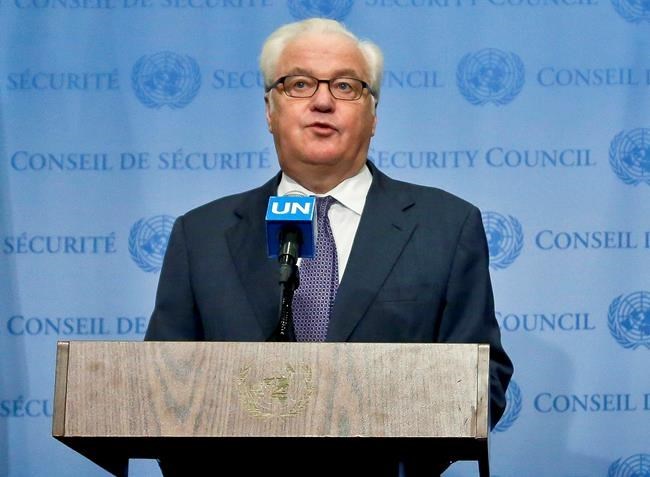
In this Oct. 6, 2016, photo, Russian U.N. Ambassador Vitaly Churkin speaks at U.N. headquarters. Russia's government lodged a formal complaint in September with the United Nations over a top U.N. official's condemnations of Donald Trump and some European politicians, diplomats told The Associated Press. There is no evidence Trump sought Russia's assistance, or was even aware of the criticism by Zeid Ra'ad al-Hussein, the U.N. high commissioner for human rights. Churkin, Russia's ambassador to the United Nations, issued a verbal "demarche" to U.N. Secretary-General Ban Ki-moon in a private meeting on Sept. 13, according to three diplomats familiar with the conversation. (AP Photo/Bebeto Matthews)
Republished October 08, 2016 - 3:45 PM
Original Publication Date October 08, 2016 - 11:05 AM
SALT LAKE CITY - If the pushback against Donald Trump becomes a Republican Party revolt, it could be said that it got its start in Utah.
Gov. Gary Herbert was the first elected official to pull his endorsement from Donald Trump as conservatives recoiled from a recording of Trump boasting of how his fame allowed him to impose himself on women. Other prominent Utah Republicans soon joined him.
Sen. Mike Lee, Reps. Jason Chaffetz, Chris Stewart and Mia Love, and former Gov. Jon Huntsman all called for Trump to abandon his campaign. Lee, who's in a re-election race, has been floated as a possible Supreme Court pick by Trump.
Utah is a deeply conservative state, with politics influenced by the Mormon Church based in Salt Lake City. But only 14 per cent of the state's Republicans voted for Trump during its caucuses in March, and Utah's favourite political son, 2012 GOP nominee Mitt Romney, is a leading critic of this year's nominee.
The Church of Jesus Christ of Latter-day Saints declined to weigh in on the issue, but the church-owned Deseret News newspaper published a scathing editorial Saturday calling for Trump to step aside.
"What oozes from this audio is evil," the paper wrote. "Nor is this an isolated incident. His reprehensible sexual speech confirms troubling reports and outrageous outbursts that have dogged his campaign from the beginning."
Tim Chambless, a political scientist at the University of Utah, recalled attending the caucuses, where attendees waved signs with red lines through the names of Trump and Democratic nominee Hillary Clinton rather than ones in favour of the candidate who ultimately won, Texas Sen. Ted Cruz.
"I saw confusion and negativity," Chambless said.
That continues. Herbert did not say for whom he would vote when he announced he could no longer support Trump. Utah's senior senator, Orrin Hatch, released a statement scolding Trump, but not pulling his support. Rep. Rob Bishop said in a statement he'll still support Trump because he's the party's nominee, even though he doesn't condone the attitude toward women in the recording. Others hoped Trump's running mate, Indiana Gov. Mike Pence, could take over.
Boyd Matheson, a veteran Utah Republican strategist who runs the conservative Sutherland Institute, said Trump will probably still win the state. Utah allows straight party-line voting, allowing voters effectively to choose the GOP nominee without having to check his name. Utah's resistance to Trump goes beyond Mormon culture, he said.
"This is the most upwardly mobile place in America, this is a place that takes care of refugees, this is a place with international reach," he said.
Libertarian nominee Gary Johnson based his longshot campaign in Salt Lake City, hoping to capitalize on the state's dislike for Trump. His spokesman, Joe Hunter, said Saturday that Johnson connects with voters as a fellow westerner.
"Trust and character are important in Utah, and for Republican leaders here, Donald Trump has just put them in a really tough spot," Hunter said.
But Johnson's socially liberal positions are an awkward fit with some in the deeply religious state. That gives an opening to Evan McMullin, a Brigham Young University graduate, former CIA officer, investment banker and congressional aide running as a third-party conservative.
"When Donald Trump says things like this it only makes our job easier," said McMullin, who thinks Utah's conservative voters align closer with him than Johnson.
Utah's unique political culture, dominated by the Mormon Church, puts a premium on personal decency and openness to immigrants and refugees. Trump has struggled to appeal to Mormons throughout the West, a challenge for him in other states with large Mormon populations, such as Nevada and Arizona. On Saturday morning, Idaho Sen. Mike Crapo, who is also Mormon, called on Trump to step aside for Pence.
Crystal Young-Otterstrom, vice chair of the LDS Democrats of America, said her group now has new ammunition to persuade Mormon voters to consider Clinton.
"If any Mormons weren't already clear about the fact that Donald Trump is a misogynist, I think it's pretty clear now," she said. "The kind of man he is profoundly contradicts what many Mormons aspire to be."
___
Riccardi reported from Denver.
News from © The Associated Press, 2016